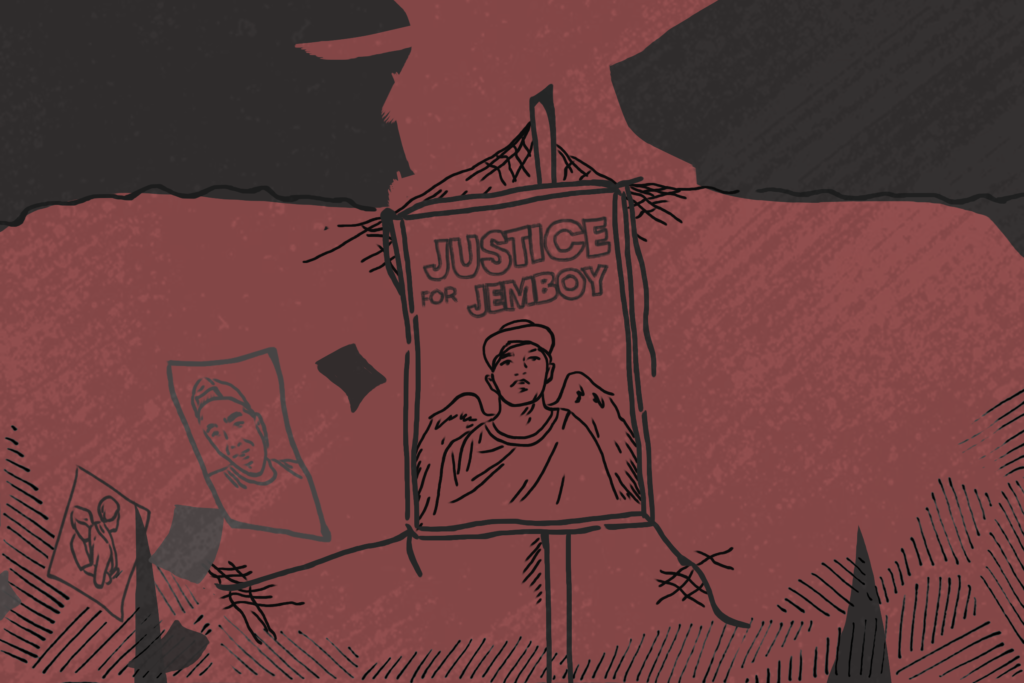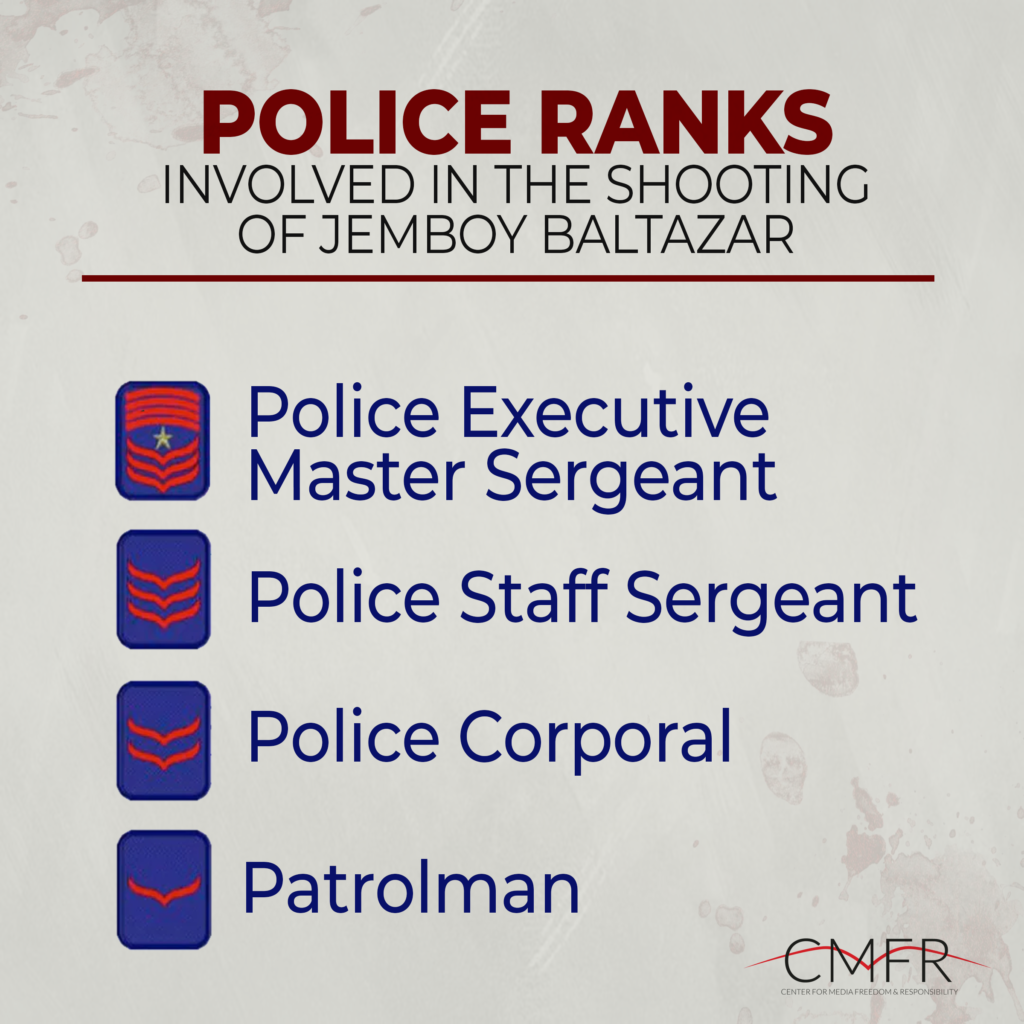Another Kian? Police killing of Navotas teen prompts media scrutiny

ON AUGUST 2, Navotas City police shot and killed Jerhode Jemboy Baltazar, 17. The killing occurred during a raid that a city police official, Colonel Allan Umipig, said was meant to locate a suspect who had escaped after a shooting incident earlier in Barangay NBBS Kaunlaran. Police said the suspect was hiding in a boat.
What the officers found instead was Baltazar and a friend, who were cleaning the boat that they were going to use for fishing. The police officers – it is not clear exactly who among the six – fired at the teenager. The Navotas police said it was a case of “mistaken identity.”
More than a week after the shooting, on August 11, forensic pathologist Dr. Raquel Fortun, who examined the teen’s remains, said Baltazar was shot twice: one on the head and another on the right hand. “This is what we call a defense-type injury,” Fortun explained. “He held his hands up in surrender.”
Fortun also noted that the head injury was not immediately fatal. The boy would have survived, she said, had the police promptly retrieved his body from the river, where it was fished out three hours after the shooting.
The six cops tagged in the killing have been relieved from their posts, but the Navotas Police did not immediately release their names. Police Brigadier General Rizalito Gapas only revealed their names on Senator Raffy Tulfo’s Wanted sa Radyo program when Baltazar’s family repeatedly asked for evidence that they have been taken into custody and relieved from their posts. They are Police Executive Master Sergeant Roberto Balais Jr., Police Staff Sergeant (PSSg) Nikko Pines Esquilon, PSSg Gerry Maliban, PSSg Antonio Bugayong, Police Corporal Edmard Jake Blanco, and Patrolman Benedict Magada.
Highlighting the parallels of the two cases was the fact that Baltazar was laid to rest on the sixth anniversary of delos Santos’ killing. Kian’s family said the two cases were identical – both teenagers were innocent, defenseless, and were brutally killed by the police. Baltazar’s relatives described him as a kind and caring child and brother. He worked as a fisherman to help his family, dreaming to be a seafarer one day.
The similarities with Kian did not end there. The two were killed in the larger context of police misconduct and abuse, and the impunity that members of the Philippine National Police (PNP) have enjoyed over the years, particularly during the six year term of Duterte.
Recalling and Probing
Rappler, TV5’s Frontline Tonight, and The Philippine Star correctly reviewed the Philippine National Police operations manual on the use of instruments to warn offenders or suspects. One rule prohibits the use of warning shots, while another explicitly states that an officer should issue a verbal warning first.
ANC’s Dateline Philippines also pointedly asked why the police officers were not in uniform but in civilian clothing. In her interview, ANC’s Karmina Constantino repeatedly asked Colonel Jean Fajardo why high-ranking police officers didn’t follow the procedures; Fajardo promised that they would be held accountable.
All of the media also reported on the fact that body cameras worn by the cops had been turned off or had run out of battery during the operation. The PNP deployed body cameras in 2021 to make police operations transparent. Rappler pointed out that the cameras would have provided evidence, especially since the complaint against the six officers was lowered from homicide to “reckless imprudence resulting in homicide due to lack of supporting information.”
‘You Are Not the Law’
Some media cited human rights and religious groups in their reports. During his homily in Baltazar’s burial, Bishop Pablo David, Catholic Bishop’s Conference of the Philippines president, admonished the police and reminded them of their sworn duty: “Mga kapatid na pulis, hindi kayo ang batas. Mga alagad lamang kayo ng batas. Hindi kayo ang inatsan, binihisan ng uniporme, inarmasan, at binabayaran mula sa buwis ng bayan para pumatay.” (Dear police officers, you are not the law. You are only enforcers of the law. You were not ordered, given uniforms, armed, and paid by the people’s taxes to kill.) Rappler, Inquirer.net, ABS-CBN News, GMA’s 24 Oras, CNN’s News Night, TV5’s Frontline Pilipinas, Star, and InterAksyon all carried Bishop David’s statement.
The Philippine Daily Inquirer and Philstar.com quoted Karapatan, which pointed out that “killings are clearly not over” and have continued under President Ferdinand Marcos Jr. Karapatan drew parallels to the cases of delos Santos, Carl Arnaiz, and other individuals killed in Duterte’s “drug war.” Human Rights Watch told Rappler that the Duterte administration did not only normalize state violence but even institutionalized it.
The Star’s editorial said that since the Duterte administration, the police culture of violence was “habit-forming.” “One doesn’t shoot first and ask questions later. Especially not the ones who are tasked to enforce the law and keep the public safe,” it said. InterAksyon captured the outrage on social media, as netizens questioned the police’s failure to uphold its core mission and follow procedures.
Media did well in its coverage of the Baltazar killing. They resisted any tendency to reduce the incident into a typical crime story, choosing instead to provide important background and context. The challenge now is to sustain this focused attention to help check the excesses of state forces and ensure that the families get the justice they deserve.
ALSO SEE: “A week of ‘isolated cases’: Teenager’s killing fits pattern of police misconduct“

Leave a Reply